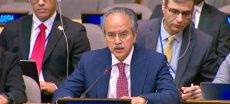[vc_row][vc_column][vc_column_text dp_text_size=”size-4″]ISLAMABAD: In the upcoming budget, the Federal Board of Revenue (FBR) has proposed a 5% tax on bonus shares issued by firms and on their undistributed profits. This idea would mostly harm family businesses while benefiting minority owners.
According to sources, the FBR is considering reintroducing two old tax provisions that were previously dropped for various reasons. These proposals include a 5% income tax on bonus shares issued by firms rather than dividends paid to shareholders.
The bonus tax idea, if accepted by the finance minister and then by the prime minister, would benefit the tax authorities in two ways. corporations that pay dividends pay a 15% tax to the FBR, while corporations that issue bonus shares pay a 5% tax to the FBR. Finance Minister Ishaq Dar will begin analysing taxing ideas and either approving or rejecting them soon, as the budget declaration is barely five days away.
In 2014, the government levied a tax on bonus shares under sections 236M and 236N of the Income Tax Ordinance. At the time, then-Finance Minister Ishaq Dar noted that the 5% income tax on bonus shares was implemented to tackle tax loopholes utilised by businesses.
Also Read: Gold prices in Pakistan fell last week.
The government is proposing a tax collection target of Rs9.2 trillion for the 2019 fiscal year, indicating a preference for extracting cash from existing taxpayers rather than extending the tax base.
The FBR has also finished a proposal to reintroduce Section 5A of the Income Tax Ordinance, which covers the tax on undistributed gains, according to sources. The previous administration had repealed this tax. According to sources, the FBR is considering a 5% income tax on corporations’ undistributed gains.
This idea is an alternative to the Reform and Revenue Mobilisation Commission’s (RRMC) proposal to levy a 5% to 7.5% tax on firms’ undistributed reserves, which is a more comprehensive approach. However, the business community and the FBR have lobbied against the RRMC proposal, prompting the tax authorities to contemplate resurrecting the old section 5A.
The Pakistan Business Council (PBC) expressed its opposition to the proposed 5% tax on undistributed reserves at a meeting with the finance minister on Saturday, citing liquidity difficulties and the expense of providing working capital.
The PBC also opposed the elimination of the final tax regime for exporters, arguing that exporters should not be exposed to the minimum tax regime. Exporters would be compelled to properly record themselves under the minimum tax regime, something they currently avoid by remaining in the final regime.
The Tola Commission proposed income tax rates of 5% for listed firms and 7.5% for non-listed corporations on their distributable reserves. Based on a total value of Rs5.44 trillion in business reserves, the Tola Commission calculated an annual income effect of Rs338 billion. The research also forecasted Rs141 billion in additional revenue from listed businesses that have not paid dividends in the last three years, with reserves totaling Rs2.8 trillion. Similarly, non-listed corporations have reserves worth Rs2.6 trillion, and the FBR could potentially produce an additional Rs197 billion in annual revenue at a rate of 7.5%.
However, the FBR opposes this idea and instead proposes reintroducing a 5% tax on undistributed profits.
Following The Express Tribune’s revelation on the RRMC proposal, corporations with considerable reserves began offering bonus shares. The Securities and Exchange Commission of Pakistan (SECP) is expected to receive at least Rs500 million in fees, averaging 0.5% of these businesses’ enlarged authorised capital. To avoid the levy, some businesses are increasing their capital levels.
According to reports, the FBR aims to levy a 5% tax on the issuance of bonus shares to counteract this tactic, which is expected to produce significant income.
Until 2019, a firm was subject to a 5% tax if it did not disperse at least 20% of its after-tax profits in cash within six months after the end of the fiscal year.
This is not the first time a suggestion to tax a company’s undistributed reserves has been raised. Similar impositions were previously attempted twice, according to Shabbar Zaidi, former Chairman of the FBR, under provisions 12(9A) of the repealed Income Tax law 1979 and section 5A of the 2001 law.
However, earlier impositions were limited to publicly traded corporations, as opposed to the current proposal to tax undistributed corporate reserves across the board.
The administration has been working hard to allay the fears of the business community, which is concerned about rising default risks and the negative impact of import restrictions.
Dar “reassured” the nation during conversations with major business organisations that Pakistan will not default and that the government has planned measures for the country’s “long-term improvement.”
The finance minister stressed the government’s goal of overcoming the crisis. Despite Pakistan having met nearly all of the standards, he acknowledged the “unprecedented delay” in achieving a staff-level agreement with the International Monetary Fund (IMF).
Furthermore, he acknowledged that the government’s severe economic measures have imposed a substantial strain on the business community and the broader population.
He slammed individuals who forecast the repercussions of default, saying, “Some people like to give dates that Pakistan will default on so and so date — they should be ashamed.”
His predecessor, Miftah Ismail, recently said that if the IMF does not intervene, Pakistan will default by October of this year.[/vc_column_text][/vc_column][/vc_row]











